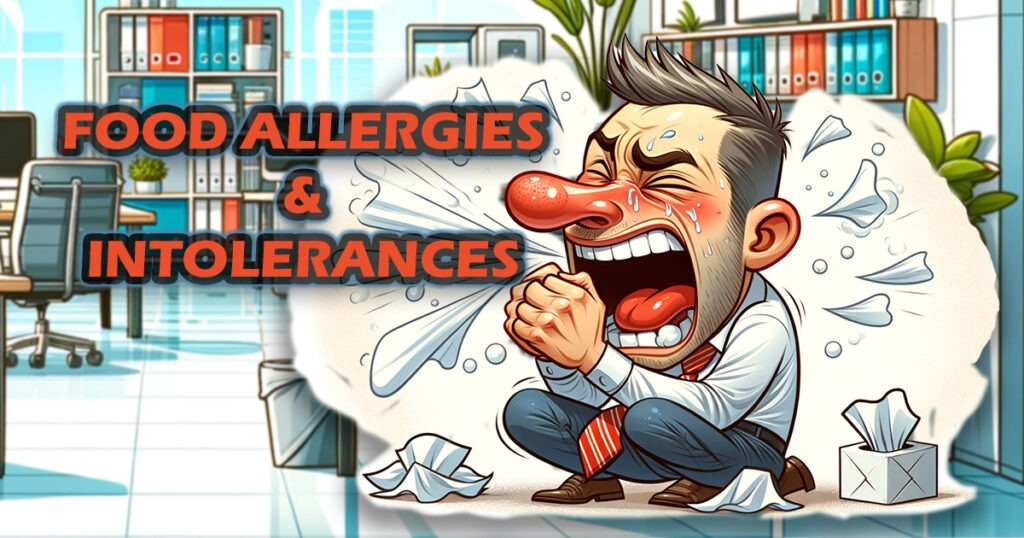Food Allergies & Intolerances: What Triggers Your Reactions?

I have discussed food allergies in many of my articles. Have you ever wondered what causes our bodies to react in a certain way to certain foods? Have you ever been on a flight, and either the captain or a flight attendant announced that someone on the plane had an allergy to peanuts and requested that no one eat them or anything that contains them? What’s going on inside some people’s bodies that just being around certain foods triggers a reaction? Let’s explore.
What Is an Allergy
The Oxford Dictionary defines allergy as a damaging immune response by the body to a substance, especially pollen, fur, a particular food, or dust, to which it has become hypersensitive.
According to the National Institute of Allergy and Infectious Disease, food allergies occur when the body’s immune system overreacts to a particular protein found in a food. This happens when the immune system mistakenly identifies a harmless substance as harmful and produces immunoglobulin E antibodies to react to it. The chemicals released by these antibodies cause the symptoms of an allergic reaction.
The Origin of Food Allergies
One theory by Giulia Enders, M.D., author of “Gut: The Inside Story of Our Body’s Most Underrated Organ,” suggests that the origin of food allergies may begin with the digestive processes in the small intestine. She writes in her book, “If we fail to break down a protein into its constituents’ amino acids, tiny bits will remain. Under normal conditions, those tiny particles don’t make it into our bloodstream, and there is no problem. However, those tiny particles can enter the lymphatic system, embedded in fat droplets, and once there, they attract the attention of ever-vigilant immune cells. When the immune cells discover a tiny particle of peanut in the lymphatic fluid—like a Brazil nut in my case—they naturally attack it as a foreign body.” Furthermore, the next time the immune cells encounter a peanut particle, they are better prepared to deal with it and will attack it more aggressively.
The attacks continue until a person reaches a stage where even consuming a peanut triggers their immune cells to attack. Some allergens become so severe that just inhaling peanut dust, particles, or oils that have become airborne can cause an allergic reaction; this explains why it’s often advised not to consume peanuts or products containing peanuts during a flight.
Allergies can be so severe that they can lead to extreme allergic reactions, such as swelling of the face and tongue. These extreme reactions especially apply to allergies caused by fatty, protein-rich foods like milk and eggs. Odors can also cause conditioned physical responses in some people, such as skin rashes, anxiety, or a change in blood pressure.
Gluten Sensitivity or Celiac Disease
People with celiac disease can suffer from allergies to gluten, a protein found in wheat. When consuming gluten, they may experience severe immune reactions or damage to the villi of the intestinal wall or the nervous system. Celiac disease can cause diarrhea and a failure to thrive in children, who may show reduced growth or winter pallor.
It’s believed that the gluten allergen develops in the small intestines. However, the exact cause of gluten intolerance is still out for debate. Some surmise that the intolerance is caused by a combination of genes and consuming food with gluten. Other practices considered factors include infant-feeding practices, gastrointestinal infections, and gut bacteria. According to an article published by Cleveland Clinic Health Library, some research suggests that people may not be sensitive to gluten but to a carbohydrate found in many foods, which their bodies can’t absorb properly. The carbohydrate stays in the gut and ferments, causing sickness. Other research suggests that wheat may affect the lining of some people’s digestive tracts, allowing bacteria into their blood or liver and causing inflammation.
Lactose Intolerance
Many people are lactose intolerant, a digestive condition that occurs when the body cannot digest lactose, a sugar in milk and dairy products. It is also known as lactose malabsorption. According to Dr. Giulia Enders, lactose intolerance is a deficiency, not an allergy. But like allergens, it also results from the body’s failure to completely break down certain nutrients into their parts.
Lactose consists of two sugar molecules linked by a chemical bond. The body requires a digestive enzyme to break that bond, but unlike other enzymes, this one does not come from the papilla. The cells of the small intestine secrete it themselves on the tips of their tiny little villi. Lactose breaks down when it comes in contact with the enzyme on the gut wall, and the resulting single sugars can then be absorbed. If the enzyme is missing, similar problems arise to those caused by gluten intolerance or sensitivity, such as:
- Flatulence
- Diarrhea
- Belly pains
- Stomach cramps
- Nausea
- Stomach rumbling
Symptoms usually develop within a few hours of consuming lactose. Every human being has the genes needed to digest lactose. In some cases, problems with lactose digestion can occur from birth. Lactose intolerance is widespread in Asian Americans, African Americans, Mexican Americans, and Native Americans. However, in 75 percent of the world’s population, the gene for digesting lactose slowly begins to switch off as people age.
Unlike in celiac disease, undigested lactose particles do not pass through the gut wall. Instead, they move down the line into the large intestine, where they become food for the gas-producing bacteria.
Understanding Fructose Intolerance
The most common food intolerance in the Western hemisphere is trouble digesting the fruit sugar fructose. According to research, it affects about 40 percent of the overall population. Hereditary fructose intolerance (HFI) is a genetic disorder that prevents people from digesting fructose, a sugar found in fruits. HFI is an autosomal recessive disorder that causes some people to lack the enzyme aldolase B, which is needed to break down fructose. Symptoms usually develop in infancy when a person starts eating or drinking fruits, juices, or other foods containing fructose. After consuming fructose, those who suffer from HFI may experience the following symptoms:
- Nausea
- Bloating
- Abdominal pain
- Diarrhea
- Vomiting
- Low blood sugar
- Affected infants may fail to grow and gain weight at the expected rate
Fructose intolerance involves mechanisms distinct from those involved in gluten or lactose digestion. In individuals with hereditary fructose intolerance (HFI), cells contain fewer enzymes needed to process fructose. This leads to the accumulation of fructose within cells, disrupting various cellular processes. For those who develop fructose intolerance later in life, it is believed to be due to a reduced ability of the gut to absorb fructose. This condition may be linked to an imbalance in gut flora, which plays a critical role in digestion and nutrient absorption.
Impact of Fructose Intolerance on Nutrition and Mood
Fructose intolerance can also affect mood and overall well-being—sugar, including fructose, aids in absorbing other nutrients into the bloodstream. The amino acid tryptophan, which is essential for the production of serotonin (a neurotransmitter often referred to as the “happiness hormone”), tends to bind with fructose during digestion. When fructose is not properly absorbed due to intolerance, the associated tryptophan is also not absorbed. A deficiency in tryptophan can lead to lower serotonin levels, potentially causing depressive disorders. Therefore, unrecognized fructose intolerance might contribute to mood disorders over time.
Serotonin has multiple roles in the body, including regulating mood and signaling satiety after meals. A deficiency in serotonin due to fructose intolerance can lead to continuous eating or snacking, as the feeling of fullness is compromised. This behavior, combined with other symptoms such as stomach aches, can be indicative of fructose intolerance.
By understanding the distinct mechanisms and effects of fructose intolerance, individuals can better manage their symptoms and seek appropriate dietary and medical interventions.
In Conclusion
The purpose of this article is not to instill fear about food allergies but to raise awareness of certain foods that may cause harm. If you frequently experience symptoms mentioned in this blog, your body is trying to communicate with you, and listening is crucial. Identifying whether you’re dealing with an allergen or intolerance can be challenging. If you suspect a specific food, try eliminating it from your diet and observe if your symptoms improve.
It’s also important to recognize that food sensitivities are not always solely due to the foods you consume. Factors like antibiotics, high-stress levels, and gastrointestinal infections often trigger temporary sensitivities. Once the body returns to a healthy equilibrium, the gut can usually begin to heal.
Understanding your body’s functions is critical to reversing sickness and preventing it altogether. While it is often stated that all diseases originate in the gut, this article also aims to highlight the significant role of the lymphatic system in dealing with allergens. So, pay close attention to your diet and gut health, but don’t forget the importance of your lymphatic system. By being mindful of both, you can better manage and potentially alleviate your symptoms.
I hope you found this article helpful. Please share it with someone who you think may be blessed by it. As always, take care of yourselves and have a happy healing. See you next time.
Related Links
Signs of an Unhealthy Lymphatic System
Understanding How Herbs Help the Body to Heal Itself (Video)
